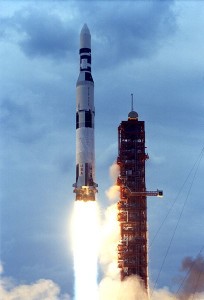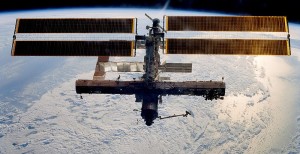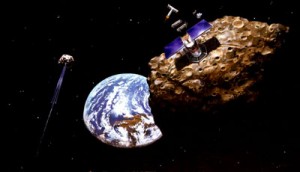So I’ve noticed that I often start these things with a little anecdote which I then try to connect to whatever topic I intend to talk about. I then wander hopelessly off course and wind with bare coherence by about the end. I’m not sure entirely how I feel about this or why I like to start this way. Maybe I like to feel connected to my topics, or maybe like a lot of folks these days I’m just hopelessly self absorbed and can’t quite get away from myself. Well, whatever, here goes.
When I was a kid I used to draw constantly and almost all of my drawings could be separated into three kinds: airplanes, rocket ships, and weird underground complexes on other planets. In grade six I even remember doing a project where I taught my entire class how to draw a rocket ship from start to finish. The ships I used to draw were these vaguely Saturn V like things because when I was a kid that is what a rocket ship looked like, at least here in North America. That or the space shuttle. The Space Shuttle was alright but I always had my heart set on the Saturn V. It took people to the moon! Now I know the shape of the Saturn V must have the Freudians smirking right now, phallic something or other, but its aerodynamics okay? Besides I’m pretty sure Freud isn’t cool right now anyway.
 It wasn’t just me either. Space flight has been fascinating for those of us stuck down here on Earth for a long time. Memories of watching the first moon landing in 1969 have had a lasting impact on an entire generation. While it was a tragedy, some of my earliest memories are of the 1986 Challenger disaster. I love TV shows like Star Trek and movies like Star Wars and was always fascinated by the idea that ordinary people could live and work in space. In our day and age this is quite far from the reality with only the barest few (fewer than 550) people having ever been to space and even fewer that could be said to currently work there. In 1971 the first inhabited space station Salyut 1 was launched and manned by the Russian space agency and since then 8 other manned space stations have existed in low earth orbit preforming all kinds of scientific research. We have also landed people on the moon six times between 1969 and 1972. These large scale space expeditions have a three main things in common. Firstly they were completed by national government agencies, secondly their main purpose was scientific, and finally they cost an (to pardon the pun) astronomical amount of money. But all that will soon start to change.
It wasn’t just me either. Space flight has been fascinating for those of us stuck down here on Earth for a long time. Memories of watching the first moon landing in 1969 have had a lasting impact on an entire generation. While it was a tragedy, some of my earliest memories are of the 1986 Challenger disaster. I love TV shows like Star Trek and movies like Star Wars and was always fascinated by the idea that ordinary people could live and work in space. In our day and age this is quite far from the reality with only the barest few (fewer than 550) people having ever been to space and even fewer that could be said to currently work there. In 1971 the first inhabited space station Salyut 1 was launched and manned by the Russian space agency and since then 8 other manned space stations have existed in low earth orbit preforming all kinds of scientific research. We have also landed people on the moon six times between 1969 and 1972. These large scale space expeditions have a three main things in common. Firstly they were completed by national government agencies, secondly their main purpose was scientific, and finally they cost an (to pardon the pun) astronomical amount of money. But all that will soon start to change.
In the past few decades various private companies have begun to take a role in the launching of spacecraft. Whether to put satellites into space or as in the recently successful ISS (International Space Station) resupply mission flown by the SpaceX Dragon spacecraft, private companies are taking a increasingly larger share of space flights and missions. This month also marked the maiden flight of the Orbital Science Corporation’s Antares rocket which will also launch payloads into orbit and service the ISS. As well as carrying a mass simulator filled with test and diagnostic equipment the Antares rocket also carried four CubeSats. CubeSats are small (10cm cubed) satellites that can be launched for such a low cost that universities and corporations worldwide can use them for testing tech and doing their own experiments. More and more people are being given a greater access to space.
Commercial and research applications aren’t the only areas where business is picking up. Space tourism is also poised to become very big business. In 2001 American multimillionaire Dennis Tito became the first person to become a so called space tourist. For the price of 20 million dollars Tito was able to spend a little over a week aboard the ISS. Since then half a dozen more millionaires have made the trip from prices ranging from 20 to 40 million dollars. While the price is right out of reach for just about anyone, companies like Virgin Galactic are looking at ways to make sub orbital and orbital space flight “more affordable.” With a price tag of something like $200 000, Virgin Galactic hopes to start sub orbital flights sometime in 2013 and is already in the late stages of testing their vehicle SpaceShipTwo. With other companies expressing interest in similar flights the cost of these trips is expected to drop steadily over the next few decades.
 Another area of research and development that is opening space to commercialization is space mining. Companies like Planetary Resources and Moon Express are already looking at the future of using near earth asteroids or even the moon as potential sources of platinum group metals and other materials that could be used in the further construction of space infrastructure. NASA is also seeking money to research the possibilities of asteroid mining and the ESA has talked about developing ways to use the resources present of the Moon to construct and operate outposts there.
Another area of research and development that is opening space to commercialization is space mining. Companies like Planetary Resources and Moon Express are already looking at the future of using near earth asteroids or even the moon as potential sources of platinum group metals and other materials that could be used in the further construction of space infrastructure. NASA is also seeking money to research the possibilities of asteroid mining and the ESA has talked about developing ways to use the resources present of the Moon to construct and operate outposts there.
The costs of space travel and exploration are still very high and of course there are still many safety risks involved in space travel. Astronauts and even space tourists like Tito must past rigorous tests before spending time in space and there are still many unknowns about the effects of long term weightlessness. There have also been many high profile disasters and failed missions but that is no reason for research and exploration to cease. As utilization of space becomes democratized and more people and companies gain access to the technologies costs will go down, and newer and safer technologies will be developed. I will probably never get to travel into space, but I think that my children might, and my grandchildren most certainly will. For now this will have to do. (http://www.youtube.com/watch?v=ls9yJTphLxg )
D.

Take a trip out to the rockies sometime.. find a high point away from people (ex: Moraine Lake) and stare at a starfield unlike anything you’re used to. If you plan it right, you’ll get the northern lights too… good times.
I’ve always loved looking at the stars and as a kid I think it was the best thing about going camping. It’s hard to get a good look living in the city, and whenever I can get far enough I way, I always spend time looking up. My girlfriend has made it one of her life goals to see the Northern Lights, so we’ll have to get on that.